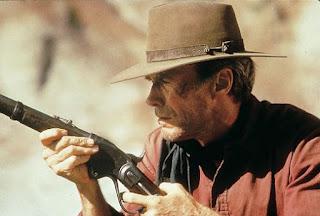
"You just shot an unarmed man!" "Well, he should have armed himself..."
The success of Unforgiven lies not in the script which has been doing rounds of Hollywood for almost 20 years, but in Clint Eastwood's distinctive storytelling which gave the Western genre it's most sublime story. And I dare say this but Unforgiven will always remain to be the last Western. The spirit of Unforgiven, from the opening scene of the house with the scrawny tree and lonely grave, to the end which returns there, is imbued with the finality of a spent genre.
The story of Unforgiven follows William Munney, a retired gunslinger, a hellraiser, killer of women and children, who has spent the last ten years of his life living peacefully as a pig farmer. He is a reformed man, tamed by his late wife, trying to make a decent living as he wrestles with his desire to honor his wife's memory and his need to feed his children. But earning an honest dollar is not easy. So when The Schofield Kid (Jaimz Woolvett) offers him half-share of the reward offered by a group of prostitutes for the scarring of one of their own by a cowboy in the town of Big Whiskey, Munney feels tempted and reluctantly accepts the offer. Then with the help of Ned Logan (Morgan Freeman) the trio work together to track down the criminals. But thing won't be as easy for them as it used to be in their younger days. Munney is just a sad bit of history now. And since the time words of the bounty has spread and as the events spiral out of control, the sheriff Little Bill Daggett (Gene Hackman) has taken charge of the situation and decides to keep the guns on hire out of town, by any means necessary.
There are no heroes or villians in this film, and the differences between good and bad are deliberately blurred. In a way this is not a typical Western like the Magnificant 7 where enemies could easily be separated out from the rest and gunslingers were attractive and fascinating to the audience, exuding flair, charisma, and sparking the imagination. Every character in this movie inhabits a gray zone that clouds the audiences' ability to easily categorize them as good or evil. Little Bill in the opening scene let's the crime go unpunished but later exposes English Bob and tries to keep people from getting killed by almost getting English Bob murdered. But Little Bill is just doing his job, swinging the hammer against evil for good. And then we have Munney, depicted as a misunderstood old man who has atoned for past wrongs. He is a broken human person, so lost along the moral frontier that the only compass he can grasp is more killing.
At 2 hours 10 minutes, the story of the film gets you glued to it from the beginning of the movie till it ends with its gripping tale. Not only are the principal characters well-developed, but even minor characters come across as real people with individual traits; the credit is due both to the excellent screenplay and to the superb cast. Clint Eastwood is simply superb as the tortured and self-loathing Munny; Gene Hackman fully matches him as Little Bill; Morgan Freeman exudes a quiet dignity as Ned; Wolvett acquits himself well as "the Kid." Add to this a scene-stealing performance by Richard Harris as the elegant, vicious gunslinger English Bob.
Most people who are accustomed in seeing Clint Eastwood in his Westerns of old or the 'Dirty Harry' movies may enter the cinema with expectations of such like will either be disappointed or pleasantly surprised. It is the atypical Western and an unfamiliar portrayal by Eastwood, and rather than being a movie about the end of the Western genre, Unforgiven is actually an ode to what came before it. One might say that Munny's heroics in the guns-blazing climax undercut the film's purpose of dismantling the mystique of the Old West and its gunfighters. But the truth is, Unforgiven is both an homage to and a deconstruction of that mystique. While Munny acquires almost mythic stature in that scene, his actions are still morally shady, and his exchange with the nerdy Beauchamp quickly dispels the romantic aura. What's more, his "rise" to heroism can also be seen as a fall from grace and a reversion to his old ways.
Unforgiven proves though, both to the writer W.W. Beauchamp (Saul Rubinek) and to the audience, that there is a flip side to every story and a dark side to every man.
